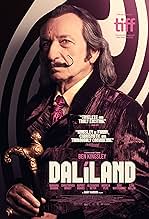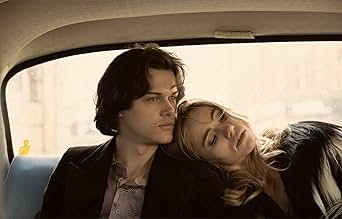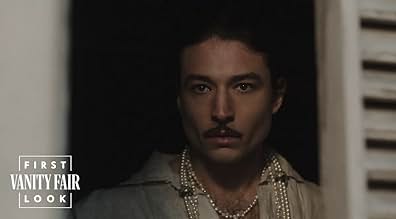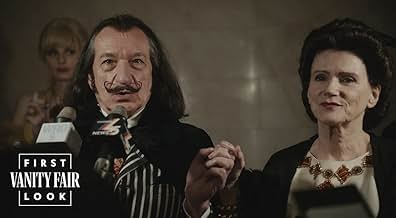IMDb-BEWERTUNG
5,9/10
2846
IHRE BEWERTUNG
1973 erlebt ein junger Galerieassistent ein wildes Abenteuer hinter den Kulissen, als er dem alternden Genie Salvador Dali hilft, sich auf eine große Ausstellung in New York vorzubereiten.1973 erlebt ein junger Galerieassistent ein wildes Abenteuer hinter den Kulissen, als er dem alternden Genie Salvador Dali hilft, sich auf eine große Ausstellung in New York vorzubereiten.1973 erlebt ein junger Galerieassistent ein wildes Abenteuer hinter den Kulissen, als er dem alternden Genie Salvador Dali hilft, sich auf eine große Ausstellung in New York vorzubereiten.
- Auszeichnungen
- 2 Nominierungen insgesamt
Empfohlene Bewertungen
Greetings again from the darkness. Sure, it's an unusual approach; however, when it comes to Salvador Dali, the eccentric and iconic Spanish surrealist, a 'normal' introduction simply won't do. Director Mary Harron (I SHOT ANDY WARHOL 1996, AMERICAN PSYCHO 2000, THE NOTORIOUS BETTIE PAGE 2005) shrewdly opts for an opening scene of the artist appearing on the classic TV game show, "What's My Line?". Lead actor Ben Kingsley (Oscar winner for GANDHI, 1982) has been superimposed over the familiar archival footage as he mimics the artist's actual answers more than 60 years ago.
Screenwriter John Walsh (director Harron's husband) structures the story around James (newcomer Christopher Briney), a young man Dali selects as his new assistant ... and nicknames San Sebastian. This approach makes some sense as Dali was seemingly always on display and viewed as a curiosity to most. Yet James turns out to be the least interesting character on screen, and we wish for less of him and more of Dali, or Dali's wife Gala, or Dali's transgender nurse and muse Amanda Lear (Andreja Pejic), or even the flashbacks with Ezra Miller and Avital Lvova as young Dali and Gala.
It's 1974 and "Welcome to Daliland" is how James is first invited into the St. Regis Hotel suite where Dali spent winters in New York City for forty years. Production Designer Isona Rigau captures the essence of the hotel, especially during the infamous parties thrown by Dali ... even as Gala urged him to focus on work. Gala, played exceedingly well by Barbara Sukowa (HANNAH ARENDT, 2012), and Dali, show us the ups and downs of a codependent arrangement. She is shown pushing him towards success, and also at least partially responsible for his burnout and decline. Money was a constant battle as both enjoyed the high life. Dali loved the parties, while Gala enjoyed the company of younger men. The long-rumored signatures on blank canvas and the uncashed personal checks with the valuable signature are both addressed here.
Although it's been forty years since Sir Ben Kingsley won his Oscar, he still knows how to seize a character and fill the screen. Not only does he embrace the pumped-up ego of a genius, he also conveys the worst fear of an artist - a tremor in his painting hand ... although, to be fair, his fear of abandonment might have been even stronger. This is a man who knows he's approaching the end of his career and life, but chooses to live until he can't.
The flashbacks and the artsy moments where Dali conducts the wind from atop a seaside cliff are creative inserts worthy of one viewed as an icon, rather than as a man. Watching Dali hum while he works, or dominate a moment with his verbosity, or become emotional with Gala, all combine to provide a glimpse into Dali, the man and the artist.
In theaters and On Demand beginning June 9, 2023.
Screenwriter John Walsh (director Harron's husband) structures the story around James (newcomer Christopher Briney), a young man Dali selects as his new assistant ... and nicknames San Sebastian. This approach makes some sense as Dali was seemingly always on display and viewed as a curiosity to most. Yet James turns out to be the least interesting character on screen, and we wish for less of him and more of Dali, or Dali's wife Gala, or Dali's transgender nurse and muse Amanda Lear (Andreja Pejic), or even the flashbacks with Ezra Miller and Avital Lvova as young Dali and Gala.
It's 1974 and "Welcome to Daliland" is how James is first invited into the St. Regis Hotel suite where Dali spent winters in New York City for forty years. Production Designer Isona Rigau captures the essence of the hotel, especially during the infamous parties thrown by Dali ... even as Gala urged him to focus on work. Gala, played exceedingly well by Barbara Sukowa (HANNAH ARENDT, 2012), and Dali, show us the ups and downs of a codependent arrangement. She is shown pushing him towards success, and also at least partially responsible for his burnout and decline. Money was a constant battle as both enjoyed the high life. Dali loved the parties, while Gala enjoyed the company of younger men. The long-rumored signatures on blank canvas and the uncashed personal checks with the valuable signature are both addressed here.
Although it's been forty years since Sir Ben Kingsley won his Oscar, he still knows how to seize a character and fill the screen. Not only does he embrace the pumped-up ego of a genius, he also conveys the worst fear of an artist - a tremor in his painting hand ... although, to be fair, his fear of abandonment might have been even stronger. This is a man who knows he's approaching the end of his career and life, but chooses to live until he can't.
The flashbacks and the artsy moments where Dali conducts the wind from atop a seaside cliff are creative inserts worthy of one viewed as an icon, rather than as a man. Watching Dali hum while he works, or dominate a moment with his verbosity, or become emotional with Gala, all combine to provide a glimpse into Dali, the man and the artist.
In theaters and On Demand beginning June 9, 2023.
I remember being taught about Salvadore Dalí in high school (decades ago!) and was intrigued by his surrealist art. But I have never known much about him as a person. Dalíland is a captivating drama that delves into this man's life and artistic journey. Dalí was an influential and controversial figure of the 20th century. This film explores Dalí's years in Spain, followed by his remarkable ascent to fame in Paris as a key leader of the surrealist movement. Throughout his journey, we witness the complexities of his relationships with family, his muse Gala and fellow artists like Luis Buñuel and Federico García Lorca. The movie delves into Dalí's artistic process, eccentric personality, and unyielding fascination with immortality.
Directed by Mary Harron, known for her work on films like Psycho and The Notorious Bettie Page, Dalí boasts meticulous attention to detail and a delightful touch of humour that perfectly captures the essence of Dalí's whimsical world. Visually striking with its colour palette and imaginative interpretations of Dalí's paintings, this film showcases the impeccable cinematography by Marcel Zyskind, which masterfully juxtaposes realism with surrealism within each scene. Isona Rigau's remarkable production design flawlessly recreates settings and costumes with precision and flair. The special effects employed are also noteworthy in those mesmerising moments where Dalí's paintings spring to life.
The movie showcases a cast led by Ben Kingsley in the role of Dalí. Kingsley delivers a captivating portrayal capturing the complexity and charisma of this genius madman. He skillfully embodies Dalí's mannerisms, accent and expressions with subtlety. He effectively conveys Dalí's emotions, from passion and joy to fear and loneliness. Supporting Kingsley is Barbara Sukowa, as Gala, who delivers a sympathetic performance as Dalí's partner (Dalí would have been almost impossible to live with). Manville portrays Gala's intelligence, charm, and ambition while expressing her frustration and pain at being overshadowed by Dalís fame and eccentricity. There's a large supporting cast, all putting in good performances.
Unfortunately, Dalí sometimes suffers from a lack of focus and coherence; it jumps from one episode to another without a clear narrative thread. It also attempts to cover too much ground within its two-hour runtime resulting in a superficial overview that feels disjointed. The movie also misses the chance to delve into some of Dalí's aspects, like his beliefs, sexual orientation, and exploitation of Gala. These issues are either skimmed over or lightly touched upon in the film missing out on an opportunity to present a critical perspective on Dalí. Despite the events in Dalí's life, the film lacks impact. It fails to make us truly care about Dalí or his relationships, leaving us detached and indifferent.
Dalíland is a film with potential but falls way short of its ambitions. It is visually stunning and entertaining as it showcases Dalís artistry and personality, but it also comes across as shallow and fragmented, unable to capture the essence and significance of Dalí. While it may appeal to fans of Dalí and surrealism, it may disappoint those seeking insights into one of history's captivating artists.
Directed by Mary Harron, known for her work on films like Psycho and The Notorious Bettie Page, Dalí boasts meticulous attention to detail and a delightful touch of humour that perfectly captures the essence of Dalí's whimsical world. Visually striking with its colour palette and imaginative interpretations of Dalí's paintings, this film showcases the impeccable cinematography by Marcel Zyskind, which masterfully juxtaposes realism with surrealism within each scene. Isona Rigau's remarkable production design flawlessly recreates settings and costumes with precision and flair. The special effects employed are also noteworthy in those mesmerising moments where Dalí's paintings spring to life.
The movie showcases a cast led by Ben Kingsley in the role of Dalí. Kingsley delivers a captivating portrayal capturing the complexity and charisma of this genius madman. He skillfully embodies Dalí's mannerisms, accent and expressions with subtlety. He effectively conveys Dalí's emotions, from passion and joy to fear and loneliness. Supporting Kingsley is Barbara Sukowa, as Gala, who delivers a sympathetic performance as Dalí's partner (Dalí would have been almost impossible to live with). Manville portrays Gala's intelligence, charm, and ambition while expressing her frustration and pain at being overshadowed by Dalís fame and eccentricity. There's a large supporting cast, all putting in good performances.
Unfortunately, Dalí sometimes suffers from a lack of focus and coherence; it jumps from one episode to another without a clear narrative thread. It also attempts to cover too much ground within its two-hour runtime resulting in a superficial overview that feels disjointed. The movie also misses the chance to delve into some of Dalí's aspects, like his beliefs, sexual orientation, and exploitation of Gala. These issues are either skimmed over or lightly touched upon in the film missing out on an opportunity to present a critical perspective on Dalí. Despite the events in Dalí's life, the film lacks impact. It fails to make us truly care about Dalí or his relationships, leaving us detached and indifferent.
Dalíland is a film with potential but falls way short of its ambitions. It is visually stunning and entertaining as it showcases Dalís artistry and personality, but it also comes across as shallow and fragmented, unable to capture the essence and significance of Dalí. While it may appeal to fans of Dalí and surrealism, it may disappoint those seeking insights into one of history's captivating artists.
Biopic drama "Daliland" is to Salvador Dali what "My Week With Marilyn" was to Marilyn Monroe, as a fresh-faced lad (Christopher Briny) enthusiastically but naively enters (in 1974) the orbit of a living icon (Ben Kingsley (and Ezra Miller in brief flashbacks)) alongside Dali's wife Barbara Sukowa, manager Rupert Graves, muse Andreja Pejic, & many beautiful and/or famous youths (like Suki Waterhouse & Alice Cooper (Mark McKenna)) partying it up in decadent debauchery... while behind the scenes all ain't quite as it seems. Director Mary Harron & writer John Walsh give an interesting take on a fascinating character, tho only real Dali fans will be blown away by it.
I had no idea what to expect on viewing this movie, but I was not at all disappointed.
It was fantastic and so very well filmed.
We see little of the genius at work, instead what we have is a peek into the mind of Dali, and his followers.
The film reminds me that some people have minds that simply work differently from yours and mine.
The great geniuses see the world differently than we do. In other eras I am sure some of these geniuses would be unrecognized and cast out as insane.
And it has occurred to me that many such persons die early.
There is a price to pay for fame and genius.
Anyway, the acting was terrific, I actually felt like I was back in the 70s again in some of the scenes.
And the filming is most beautiful.
All in all a great movie that should be enjoyed by all.
It was fantastic and so very well filmed.
We see little of the genius at work, instead what we have is a peek into the mind of Dali, and his followers.
The film reminds me that some people have minds that simply work differently from yours and mine.
The great geniuses see the world differently than we do. In other eras I am sure some of these geniuses would be unrecognized and cast out as insane.
And it has occurred to me that many such persons die early.
There is a price to pay for fame and genius.
Anyway, the acting was terrific, I actually felt like I was back in the 70s again in some of the scenes.
And the filming is most beautiful.
All in all a great movie that should be enjoyed by all.
As noted in some other reviews, the film covers some aspects of Dali's life that are fascinating, in particular his complex relationship with Gala, his muse / lover / mother figure. The film also touches on the massive amounts of fraud occurring with Dali lithographs and prints, though it doesn't do much with this angle. So if you don't know the Dali story, this will be informational, at least about his later years. If you do know the Dali story, you will recognize the truth and have a richer experience.
While enjoyable, this film has a major structural problem. It focuses on a young person being brought into the world of Dali, and serving as our proxy as we learn about Dali, Gala and their struggles. This is a common storytelling tactic (used recently, for example, in both The Exception and Il Cattivo Poeta), but it's unnecessary and diverts attention from what we really came to see. No one will go this film for the young person's story, they will go for the Dali story.
While enjoyable, this film has a major structural problem. It focuses on a young person being brought into the world of Dali, and serving as our proxy as we learn about Dali, Gala and their struggles. This is a common storytelling tactic (used recently, for example, in both The Exception and Il Cattivo Poeta), but it's unnecessary and diverts attention from what we really came to see. No one will go this film for the young person's story, they will go for the Dali story.
Wusstest du schon
- WissenswertesEzra Miller was originally envisioned to play James Linton. Due to scheduling conflicts, Miller was eventually cast to play a younger version of Salvador Dalí, while Christopher Briney was cast as Linton.
- Zitate
Salvador Dali: Because Death is so close, is possible to make *erotic* every single moment of my life.
- VerbindungenFeatures What's My Line? (1950)
Top-Auswahl
Melde dich zum Bewerten an und greife auf die Watchlist für personalisierte Empfehlungen zu.
- How long is Daliland?Powered by Alexa
Details
- Erscheinungsdatum
- Herkunftsländer
- Sprachen
- Auch bekannt als
- Daliland
- Drehorte
- Maison de Salvador Dali, Platja de, Portlligat, Catalogne, Spanien(Dali's home and studio near Cadaques)
- Produktionsfirmen
- Weitere beteiligte Unternehmen bei IMDbPro anzeigen
Box Office
- Bruttoertrag in den USA und Kanada
- 82.769 $
- Eröffnungswochenende in den USA und in Kanada
- 27.587 $
- 11. Juni 2023
- Weltweiter Bruttoertrag
- 508.421 $
- Laufzeit1 Stunde 37 Minuten
- Farbe
- Seitenverhältnis
- 1.85 : 1
Zu dieser Seite beitragen
Bearbeitung vorschlagen oder fehlenden Inhalt hinzufügen








































